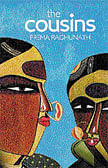
The cousins
Prema Raghunath
Zubaan
2011, pp 209
325
Barely a year old at the time of her mother’s death in 1921, Goutu learns early on to “fight, fight for everything, the hand-me-downs, the handouts, the charity.” She knows too well that her diamond-studded aunt and her cousins envy her inborn talents and want her out of their way, even dead. Cornered too often through her formative years, she cannot afford to indulge in feminine graces. The author succeeds in making us feel for Goutu.
Goutu’s life is inexorably entwined with her tormented older brother Achyut, her debonair cousin Krishna who beds all young cousins before their wedding night, and her dutiful, clever and coldly logical husband Seshadri. They are travelling companions through the journey of life, enriching each other’s perspectives over the course of time. Seshadri cannot tell a lie, not because it is a moral issue, but because “beautifying things or rendering them more palatable did not even occur to him.”
To Goutu, lying comes just as naturally. She embellishes bare facts to create an impression, escape from trouble, or not hurt another’s feelings. A solid yet unfulfilling married life leads Goutu to turn to Krishna, and fall for the dashing but unprincipled Subra.
The novel begins with Goutu in her twilight years trying to make sense of her life. “What about people like her and Krishna who were not good but not bad either? They did wrong things, but they were also right, weren’t they? What was Seshadri’s cleverness if it didn’t give him understanding?” Watching Seshadri, Achyut and Krishna fade away into death, Goutu realises liberation through her actions. Guided by her differently-enabled and insightful daughter Meera, Goutu finally understands and accepts the three men in her life with their human flaws and graces.
The writing is fluid, interspersed with passages of lovely prose. Thus, Achyut’s “mind and conversations with himself were as rich-textured as his reality was impoverished… He spoke, in the land of his head and heart, in various shades of blue and green, red rubbing shoulders with purple and merging into orange and ochre.”
However, frequent shifts in points of view from Goutu to Achyut, Krishna and Seshadri are at times abrupt and distracting, especially in the opening pages. This can hamper the reader’s deeper involvement with the characters and their stories.
Sometimes, the transitions are too rapid. In page 102, for example, Goutu has a tiff with her daughter at home. Then, we are told about a new Goutami “struggling to take birth, a Goutami who would do away with pretence, with family pressure, with compliance to society’s norms.” By the next page, before the reader can empathise with Goutu’s struggle, she is “in the boat going across”, not caring to lighten the mood.
In the very next line, we find her getting off with Seshadri at the bus stop and taking a rickshaw home. By the next page, the reader is whisked off to Krishna’s surprise re-entry into Goutu’s life. Goutu’s journey to England seeking a cure for Meera has the potential to offer more insights on Goutu’s spiritual growth.
However, this phase in the novel is too sketchy and not brought adequately to life. The entire story could have drawn on further, inviting readers deeper into the hearts and minds of the central characters.